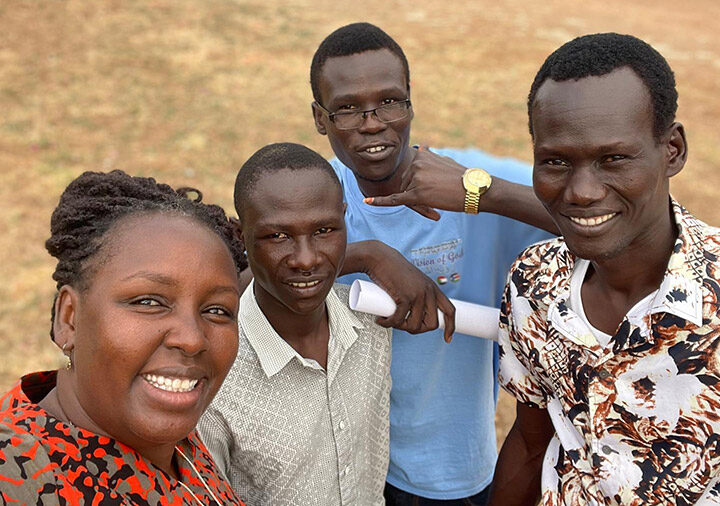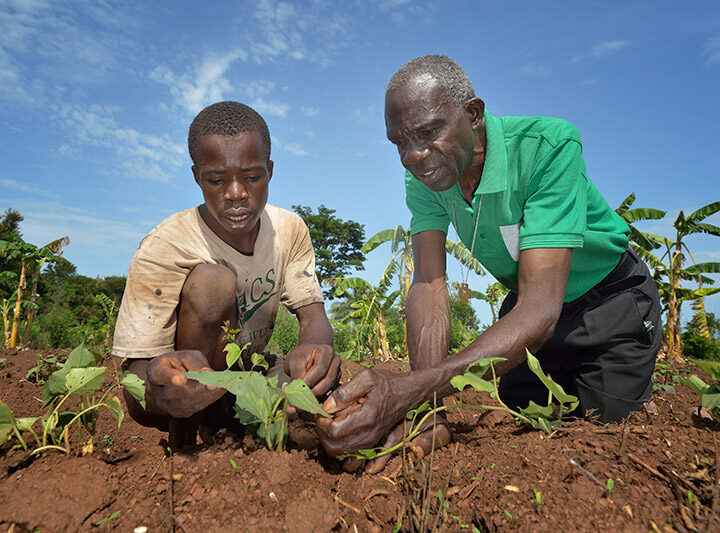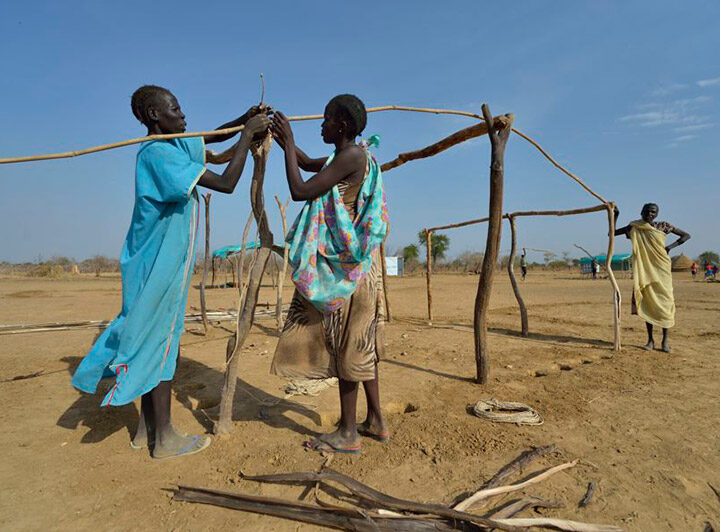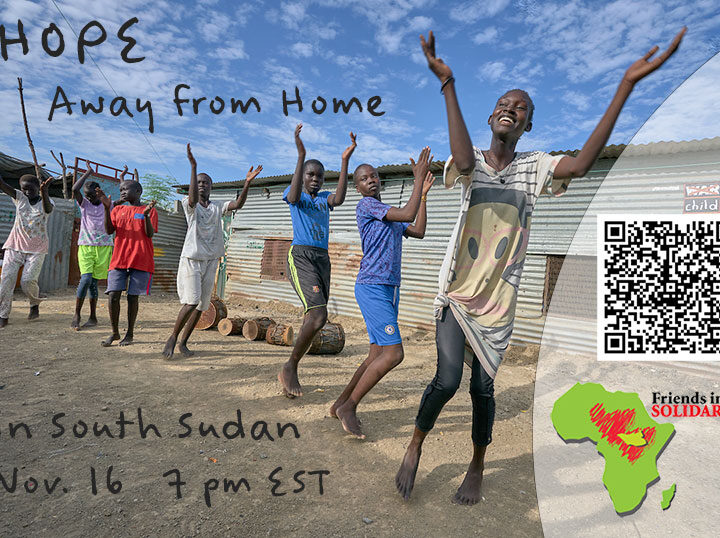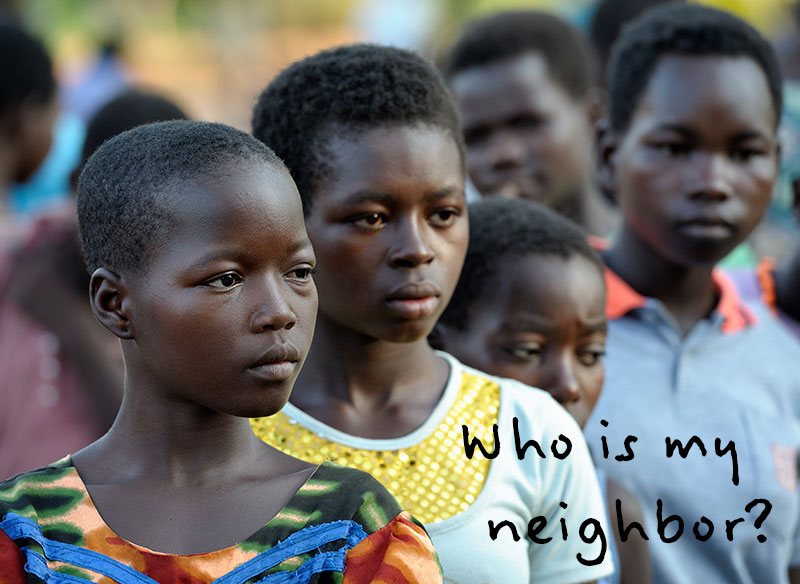
In Matthew 25, Jesus instructs us about entering the Kingdom: “Come, you who are blessed by my Father, inherit the Kingdom prepared for you from the foundation of the world.”
Good Friday is not the end of the story. After suffering pain, betrayal, duplicity, cowardice, cruelty, Jesus still believes that the human spirit, infused with God’s love, can rise above the fractured world that nailed him to the cross. Easter, the day of resurrection, is the next part of the story. We witness both in our world. We know too well the tragedy of the cross; we celebrate when the human spirit rises from the ashes and lives anew.
That Spirit came alive for the Apostles on Pentecost. That same Spirit comes alive in us when we, as Church, recognize Jesus in our suffering sisters and brothers:
-
- The progressive development of peoples is an object of deep interest and concern to the Church. This is particularly true in the case of those peoples who are trying to escape the ravages of hunger, poverty, endemic disease and ignorance; of those who are seeking a larger share in the benefits of civilization and a more active improvement of their human qualities; of those who are consciously striving for fuller growth…
-
- Finally, a word to those of you who have heard the cries of needy nations and have come to their aid. We consider you the promoters and apostles of genuine progress and true development. Genuine progress does not consist in wealth sought for personal comfort or for its own sake; rather it consists in an economic order designed for the welfare of the human person, where the daily bread that each (person) receives reflects the glow of brotherly (and sisterly) love and the helping hand of God (Populorum Progressio).
And so we pray:
- Come, Holy Spirit, fill the hearts of your faithful and kindle in them the fire of your love. Send forth your Spirit and they shall be created. And You shall renew the face of the earth.
For many of our South Sudanese friends, they experienced the coming of the Holy Spirit by the good works of their neighbors.
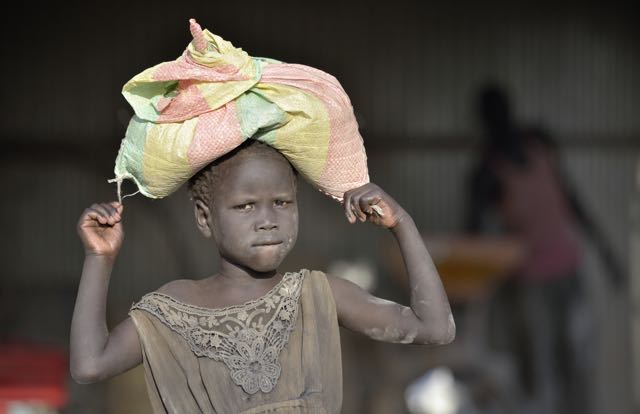
Photo by Paul Jeffrey
Come, Holy Spirit, for I was hungry, and you gave me food.
“We have no food in the house except some cassava which is keeping us alive…”
She couldn’t be happier about leaving for school in the morning. Josephine Bakhita (16) has waited for Dumak primary school to resume since all schools across South Sudan were closed in March 2020 as a COVID-19 preventive measure. She is in her final year in primary school, and in need of every minute of education possible to do well on her final exams.
Instead, books were replaced with chores at home. As the oldest of a total of six siblings, Josephine had to contribute with the many things that has to be done every day in the household. Weeding in the family’s vegetable garden was also part of her responsibility at home. As food is scarce, it is paramount to make sure the plants on the patch of land the family owns are yielding maximum results.
At school, all the students are served a hot meal every day. For many students, this is their only meal per day.
For Bakhita’s family, the school closure meant that they had to spend more money on food than before, as she didn’t get her daily portion of beans and sorghum at school. “We were happy when the schools reopened. Bakhita could go back to learning and the money we spent on extra food, we can now save or buy other necessary things.” (UNICEF.org Filling Minds and Tummies)
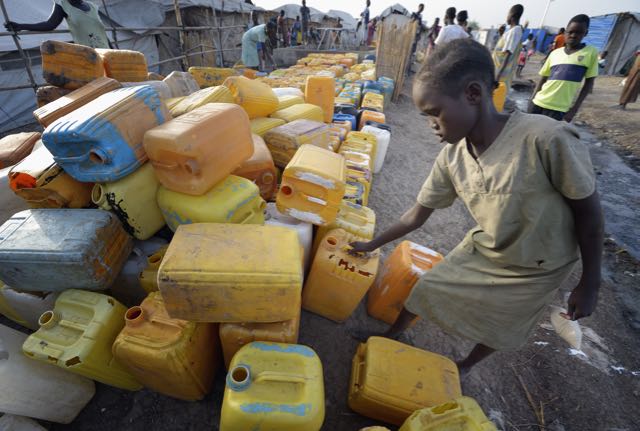
Photo by Paul Jeffrey
Come, Holy Spirit, I was thirsty, and you gave me drink.
Nya’s family had been back in the village for several months the day the visitors came; in fact, it was nearly time to leave for the camp again. As the jeep drove up, most of the children ran to meet it. Shy about meeting strangers, Nya hung back.
Two men emerged from the jeep. They spoke to the biggest boys, including Nya’s brother, Dep, who led them to the home of the village’s chief, his and Nya’s uncle.
The chief came out of his house to greet the visitors. They sat in the shade of the house with some of the other village men and drank tea together and talked for a while.
“What are they talking about?” Nya asked Dep.
“Something about water,” Dep replied
Water? The nearest water was the pond, of course, half a morning’s walk away. Anyone could have told them that.
Nya waited her turn in line. She was holding a plastic bottle. The well was finally finished.
Before the pump was used for the first time, the villagers all gathered around. The leader of the workers brought out s big sign. “In honor of Elm Street School,” Uncle said. “This is the name of a school in America. The students at the school raised the money for this well to be dug.”
When Nya reached the head of the line…she held her bottle underneath the pump mouth. The bottle filled up quickly. She stepped aside to let the next person fill a bottle. Then she drank. The water was delicious. It wasn’t warm or muddy, like the water from the pond. It was cool and clear. (“A Long Walk to Water” by Linda Sue Park)
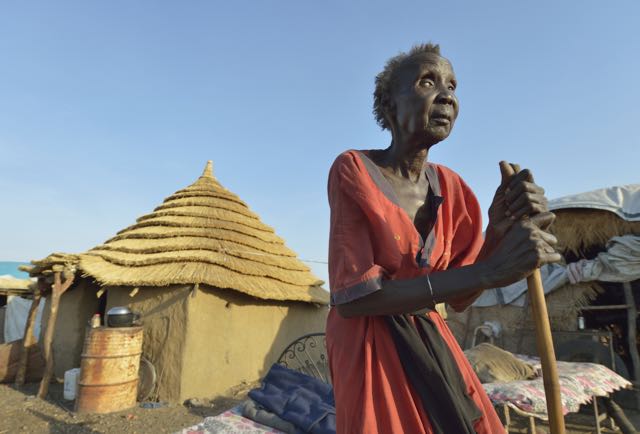
Photo by Paul Jeffrey
Come, Holy Spirit, for I was naked and clothed you.
As a result of the South Sudan Older People’s Organization and HelpAge International, I started working with an older people’s group in the camp. I learned about my rights and how to demand them.
I am inspired by the staff of SSOPO who talk passionately about our rights. They have empowered and motivated me to speak out. I have embraced the courage to talk about my rights despite the very difficult environment I find myself in as an older woman.
Women are not considered equal within our societies, but we have the determination to have this changed. I have adopted an intergenerational approach in that our group has started to engage with young women on issues such as older people’s rights and how to create better understanding between mothers and daughters-in-law.
I hear talk about equal access to services and human rights, but I am yet to see this translated into real support. I am yet to see my basic needs such as food, healthcare and clothing directly addressed.
I aspire to live in a society where I am valued and accepted, recognized for my contribution and respected. (HelpAge International, Untold stories: Nyatuong Yok Madol, South Sudan)
Come, Holy Spirit, for I was a stranger and you welcomed me.
They brought us to this place in Uganda. Now that we are here, I feel relieved. We came to a country where you see there is no disturbance, you can sleep and we do not have to run in the middle of the night under the sounds of the bullets. There is peace here and our plan is to stay and try to make our life. (OxFam International, The life of South Sudanese refugees in Uganda on hold: Beatrice’s story)
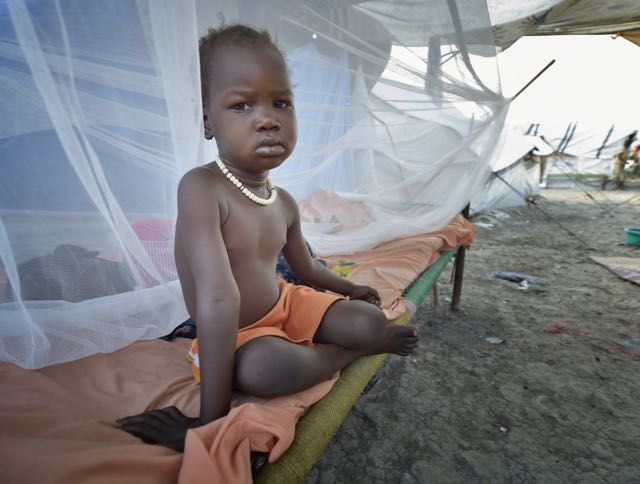
Photo by Paul Jeffrey
Come, Holy Spirit, for I was ill and you cared for me.
Mama Maze is watching while Koli is being examined at the nutrition centre. She is there with her daughters Kaka and Katalin. Kaka has been having diarrhea, coughing and high fever the last month. She has watched her daughter getting thinner by the day and she is worried about her life.
While Mama Maze was mostly worried about Kaka, the nutrition workers could immediately see that also Katalin is in trouble. The screening of Kaka shows she is suffering from moderate malnutrition, while Katalin is severely malnourished. They were both enrolled in the UNICEF supported nutrition program operated by Joint Aid Management and under normal conditions the children should bounce back within six to eight weeks. (UNICEF.org Double trouble: Conflict and floods are pushing people to their limits)
Come, Holy Spirit, for I was in prison and you visited me.
Trinity College alumnus Dr. Peter Biar Ajak is the first South Sudanese national to be awarded a PhD from the University of Cambridge.
He received his PhD nine months after a global campaign saw his release from South Sudan’s Blue House prison, which echoed nightly with the screams of tortured prisoners during his 18-month incarceration.
Arrested in July 2018 on a series of charges including treason, insurgency, harboring terrorists, espionage and insulting the president, Dr. Ajak was released in January 2020.
Relatively, he got off lightly. Still, his liver and kidney function were compromised from having to drink salty, dirty water, his back was damaged from sleeping on the floor of a tiny cell, he lost a quarter of his body weight, and needed psychological counselling. None of his belongings—laptop, phone, money or passport—were returned to him.
“My oldest son was 5 when I was arrested,” Peter says. “By the time I was released, he was 7. My youngest son was 1—he was 3 years old when I got out. I was a stranger to them, and I had to re-establish relations with them.”
Who is my neighbor?
It is Koli and Nya and Josephine and Peter. It is the person seeking a simple cup of water, a plate of nourishment, a country free from unjust systems of government.
Let us pray Francis’ Ecumenical Christian Prayer found in Fratelli Tutti:
O God, Trinity of love,
from the profound communion of your Divine life,
pour out upon us a torrent of fraternal love.
Grant us the love reflected in the actions of Jesus,
in his family of Nazareth,
and in the early Christian community.
Grant that we Christians may live the Gospel,
discovering Christ in each human being,
recognizing him crucified
in the suffering of the abandoned
and forgotten of our world,
and risen in each brother or sister
who make a new start.
Come, Holy Spirit, show us your beauty,
reflected in all the peoples of the earth,
so that we may discover anew
that all are important and all are necessary,
different faces of the one humanity
that God so loves. Amen.
Compiled/written by Sister Barbara Buckley, RSM
Photos by Paul Jeffrey


